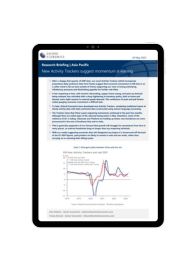Research Briefing
| May 29, 2023
New Activity Trackers suggest momentum is waning

After a choppy first quarter of GDP data, our novel Activity Trackers (which incorporate proprietary daily sentiment data from Penta) suggest that economic momentum in EM Asia is on a softer trend in Q2 (at least outside of China) supporting our view of easing underlying inflationary pressures and diminishing appetite for further rate hikes.
What you will learn:
- A late reopening in Asia, with tourism rebounding, supply chains easing, and pent-up demand being released, has coincided with a sharp tightening in monetary policy, both at home and abroad, and a tight reversal in external goods demand. This confluence of push and pull factors makes gauging economic momentum a difficult task.
- To help, Oxford Economics have developed new Activity Trackers, combining traditional inputs of timely activity data with daily sentiment data constructed using natural language processing.
- The Trackers show that China’s post-reopening momentum continued in the past few months, although there are initial signs of the rebound losing steam in May. Elsewhere, some of the resilience of Q1 is fading.
- That is generally supportive of our forecast that growth will struggle for momentum from here in many places, as external headwinds drag on longer than any reopening tailwinds.
- With our model suggesting economic data will disappoint any hopes of a turnaround off the back of the Q1 GDP figures, policymakers are likely to remain in wait and see mode, rather than carrying on or resuming their hiking cycles
Tags:
Related Services


Service
Asian Cities and Regional Forecasts
Key economic, demographic, and income and spending projections to 2035 for more than 400 locations across Asia-Pacific.
Find Out More
Service
Tourism Forecasts and Scenarios
Track, analyse, and react to macro events and future trends for the European region.
Find Out More